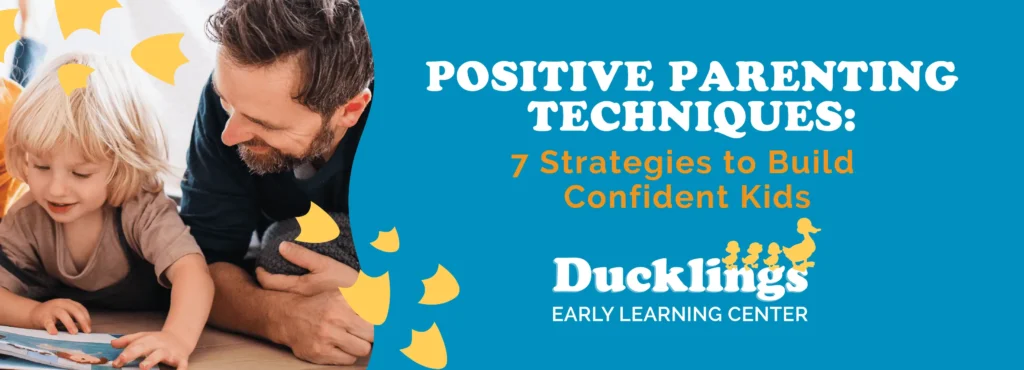
Positive Parenting Techniques: 7 Strategies to Build Confident Kids
Parenting isn’t always easy, but choosing a positive approach can make the journey more rewarding for both you and your child. Positive parenting techniques focus on empathy and connection to help children grow into resilient and compassionate individuals. At Ducklings Early Learning Center, we believe in nurturing the whole individual, and that starts with the relationship between you and your child at home.
In this blog, we’ll break down what positive parenting techniques are, why they work, and how you can start using them at home today.
What Is Positive Parenting?
Positive parenting is an evidence-based approach that encourages warmth, mutual respect and firm but fair boundaries. Instead of focusing on punishing unwanted behaviors, positive parenting techniques emphasize teaching, guiding and nurturing children through challenges. The goal is to raise children who are emotionally secure, socially capable and ready to thrive in school and life.
Why Positive Parenting Techniques Matter
Positive parenting techniques have been linked to a variety of physical and emotional benefits in young adulthood. Children with parents who consistently practiced these techniques were also shown to have a greater ability to regulate their attention and behavior. The long-term effects can include an increased ability to handle stress, reduced anxiety, and improved academic performance.
In other words, positive parenting not only helps children feel safe and loved in the short term—it also sets the stage for lifelong success.
7 Positive Parenting Techniques to Try at Home
You don’t need to overhaul your entire playbook to get started with these positive parenting techniques. Try one or two of these strategies to begin building a stronger connection with your child today.
1. Use Encouraging Language Instead of Praise
Rather than saying, “Good job!” try something like, “You worked really hard on that puzzle!” Encouraging language focuses on effort and persistence rather than outcomes, helping children build intrinsic motivation and confidence.
2. Set Clear, Consistent Boundaries
Children thrive on structure. When expectations are predictable, they feel more secure. Use simple language to explain rules, then follow through on them consistently. For example, “We read one book before bed, then it’s time to sleep.”
3. Model the Behavior You Want to See
Your child is always watching you. If you respond to frustration with calm words and deep breaths instead of outrage, they’ll learn to do the same. Try to show kindness, patience, and respect in your daily interactions. Your influence will teach them more than any lecture ever could.
4. Practice Active Listening
When your child talks, stop what you’re doing and listen. Repeat back what they say to show understanding: “You’re upset because your tower fell down.” This helps children feel heard and encourages healthy communication skills.
5. Offer Choices to Encourage Independence
Even simple choices can make a big difference for your child’s sense of autonomy. Ask, “Do you want the red cup or the blue one?” Giving your child control over these small decisions builds confidence and reduces power struggles.
6. Use Time-Ins Instead of Time-Outs
Instead of sending your child away when they misbehave, sit with them. Talk through what happened and how they’re feeling. A “time-in” focuses on teaching instead of punishing, so your child can continue to feel supported even when emotions run high.
7. Stay Calm and Regulate Your Own Emotions
Parenting can be an emotional rollercoaster, but staying calm helps you model emotional regulation. If you feel overwhelmed, take a moment to breathe before responding. It’s okay to say, “I need a minute to calm down so I can help you.”
Positive Parenting, Not Perfect Parenting
Start small. Choose one or two positive parenting techniques that feel natural to you and build from there. Remember that consistency is key, but perfection isn’t the goal. Every moment is a new opportunity to connect with your child and support their growth.
It’s also okay to ask for help! Talk to your child’s teacher about what’s working at daycare. They can often offer insights into what supports your child’s development in both settings.
How Ducklings Supports Positive Parenting
Ducklings Early Learning Centers partners with families to support every child’s development. Our curriculum fosters social-emotional learning, empathy, and communication—core principles of positive parenting. Through daily routines, play-based learning, and strong teacher-child relationships, we help your child feel safe, seen, and celebrated.
We also believe that early learning is a team effort. When families and caregivers work together, children benefit the most. Want to learn more about Ducklings’ approach to nurturing the whole child? Contact us or schedule a visit at a location near you.
